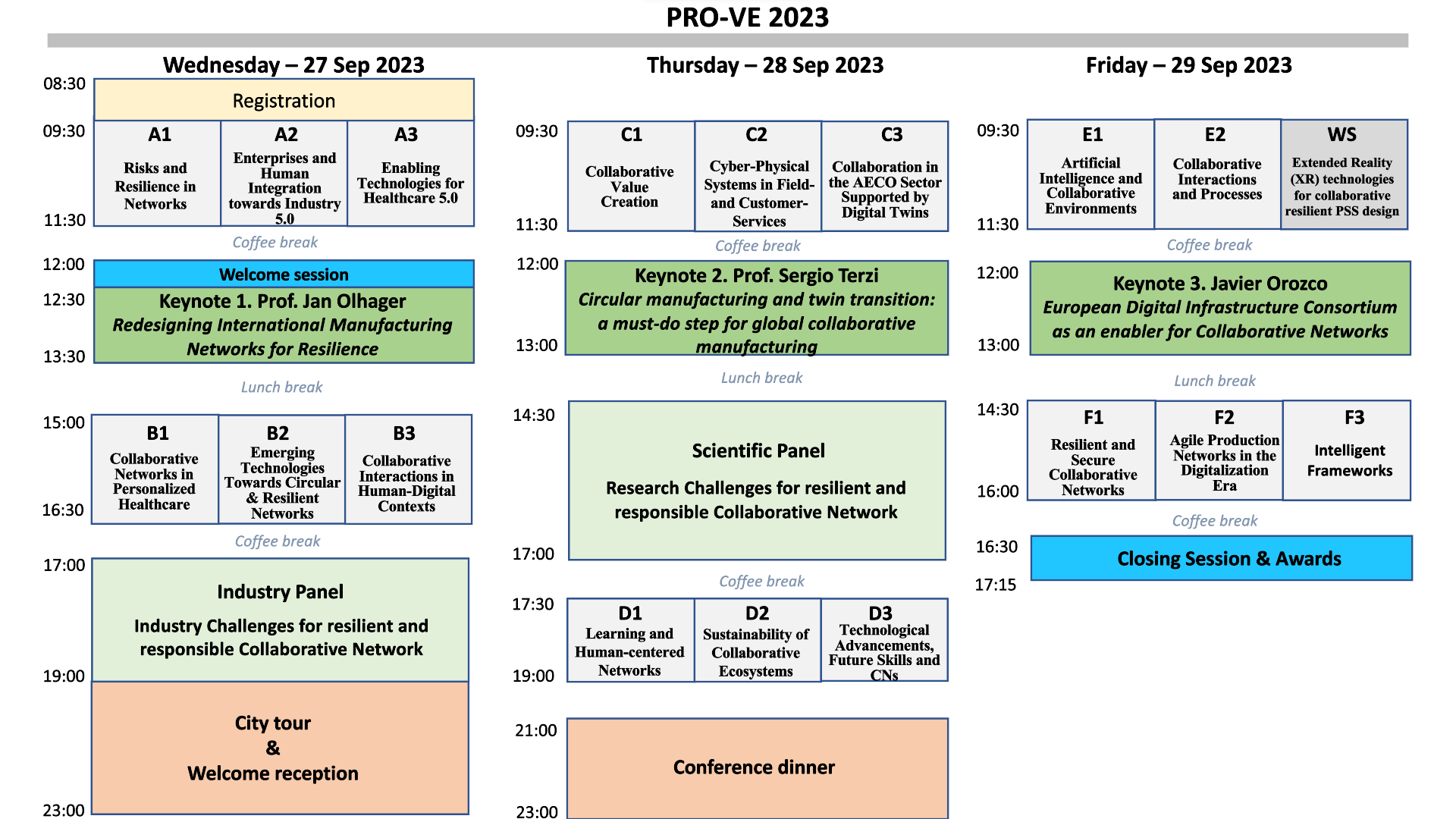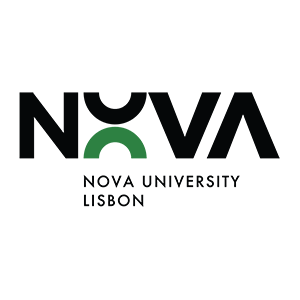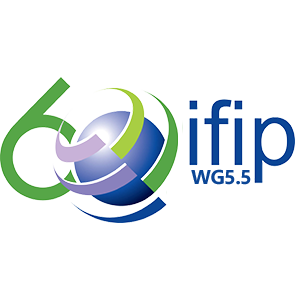
PRO-VE 2023
24th IFIP / Socolnet Working Conference on Virtual Enterprises
Valencia, Spain
27-29 Sep 2023
Keynote Speakers
Redesigning International Manufacturing Networks for Resilience
Abstract: Much has changed since the pandemic, not least the continuing widespread disruptions in international trade and the public’s appreciation of the role of global supply chains. Manufacturing companies are reviewing their international supply, manufacturing, and distribution networks, and in doing so, more factors than ever before are being considered. For example, the perspectives of risk and resilience and the balance between global and local supply chains are included to a much greater extent than before the pandemic. Such considerations raise new questions and options for design and management of plants and networks. We will highlight various aspects of the design and redesign of international manufacturing networks, such as the relationship between plants and networks, the role of the customer order decoupling point, offshoring versus reshoring as options for manufacturing relocations, and resilience.

Jan Olhager
Professor, Supply Chain & Operations Strategy, Lund University
Short biography:
Jan Olhager is Professor in Supply Chain & Operations Strategy at Lund University, Sweden. He received an M.Eng. in Industrial Engineering and Operations Research from University of California at Berkeley, USA and a Ph.D. in Production Economics from Linköping University, Sweden. He was previously Professor in Operations Management at Linköping University, Sweden, and Visiting Professor in Supply Chain Management at Monash University, Melbourne, Australia.
He is Fellow of Decision Sciences Institute (DSI) and Honorary Fellow of the European Operations Management Association (EurOMA). He is Associate Editor of Decision Sciences and IJOPM and serves on the editorial boards of IJPRand PPC. He has published more than 80 papers in international scientific journals and a couple of books. His research has received as number of awards, including the Emerald best paper award at the POM World conference in Havana, Cuba in 2016, and has accumulated over 11000 citations in Google Scholar. His research interests include international manufacturing networks, operations strategy, decoupling points, supply chain integration and operations planning and control.
He teaches Supply Chain & Operations Management in the Master programmes at Lund University and has supervised more than 150 master’s theses over the years. He has been recognized as Excellent Teaching Practitioner by the Faculty of Engineering at Lund University, and his recent teaching case on “IKEA Goes Online: Implications for its Manufacturing” – co-authored with Kasra Ferdows – received the Case Centre Award for Best Case in the category Production and Operations Management in 2023.
In his role as researcher, executive trainer, and consultant, he has worked with a broad range of companies such as ABB, Alfa Laval, AstraZeneca, Autoliv, Coca-Cola, Ericsson, GKN Aerospace, Husqvarna, IKEA, Kraft Foods, Sandvik, Scania, Toyota, and Volvo.
European Digital Infrastructure Consortium as an enabler for Collaborative Networks
Abstract: On this presentation, the new European Digital Infrastructure Consortiums (EDCIs) and their initial launch will be presented as a key enabler for Collaborative Networks. EDICs are the brand new administrative procedure by the European Commission to foster cooperation at the European Union level. Selected policy objectives will be deployed in a harmonious, inclusive, and sustainable way, through a purposely coordinated joint governance. Specifically the Smart Communities federation of data and digital services will be collaboratively co-designed for advanced digital twinning towards the citizen virtual participation (CitiVERSE).

Javier Orozco
Policy Officer at the European Comission (DG CNECT, unit C3)
Short biography:
Javier Orozco was born in Valencia (Spain) in September 1962. He is an industrial engineer from the Industrial Engineering School of the Universitat Politècnica de Valéncia (Spain) and has a PhD in Engineering. He made a Postdoc grant in the National High Magnetic Field Lab (Florida, USA).
He has worked both in Industry (Grupo Lladró), and at the University. His work has always focused on R+D and education responsibilities. He has been a senior manager with an applied science focus for many years and has several patents. Currently, he is acting as Policy Officer at the European Commission (DG CNECT, unit C3), and his research interests are focused on Materials for Energy and Building Sustainability.
Circular manufacturing and twin transition: a must-do step for global collaborative manufacturing
Abstract: In the global complex world, manufacturing is facing relevant challenges. Like most of the human activities, manufacturing is asked to provide its contribution to the continuous evolution of our modern times, becoming more sustainable (mainly reshaping its linear model to a more circular one) and taking the leap (with all the opportunities and all the risks) of the digital transformation. This double (or twin) transition is in some way mandatory for all the manufacturing “economic actors”, from companies to single operators, from production chains to global services, from geographical territories to countries.
In this presentation, we would like: (i) to give a name to such challenges, (ii) to identify some of the paths which manufacturing should / could take, (iii) to investigate the intertwined connections of the mutual transitions currently on place (or next to be).
Presenting case studies from the practice as well as some foreground works from the research (mainly from EU research projects), we would then provide our contribution and point of view on the main discussion about the future of manufacturing.

Sergio Terzi
Professor of Industrial Technologies. Politecnico de Milano
Short biography:
Sergio Terzi is Full Professor of Industrial Technologies, Department of Economics, Management and Industrial Engineering, within the School of Management of Politecnico di Milano, Manufacturing Group. He is author of more than 130 papers, in the fields of product lifecycle management, sustainable and circular manufacturing, and Industry 4.0 digital technologies, plus 3 books. He is coordinator of several EU projects and national projects in this field. He is member of IFIP WG 5.1 and IFIP WG 5.7. He is also co-founder of Miraitek, a spin-off company of Politecnico di Milano in the context of digital solutions for manufacturing. He is also serving as Associate Dean of the Graduate School of Management of Politecnico di Milano, and Director of the Executive Program in Industry 4.0 and Director of the Master in Smart Operations.
Conference Program
Full conference program can be found here.

Presentations
Full sessions program can be found here.
| 08:30 | Registration |
| 09:30 | Parallel Sessions A: |
| A1: Risks and Resilience in Networks (Salón de Actos) – Chair: Luis Osório | |
Collaborative Network Model to Reduce Logistics Costs in a Competition Environment – Mar Vazquez-Noguerol, Jose A. Comesaña-Benavides, J. Carlos Prado-Prado, and Pedro Amorim The Impact of Industry 4.0 on Supply Chain Resilience Management – Antonio Zavala-Alcívar, María José Verdecho, Juan-José Alfaro-Saiz, and Roberto González Ortega CSC-RMM: A Method for Collaborative Supply Chain Risk Mitigation – Bart Bogaard, Baris Ozkan, and Sybren de Kinderen ‘If only I knew’: Extending the SCSN Vocabulary to Improve the Resilience of Supply Chain Networks – Jelte Bootsma and Wico Mulder |
|
| A2: Enterprises and Human Integration towards Industry 5.0 (Salón de Grados I) – Chairs: Arturo Molina and Ricardo Rabelo | |
Emerging Approaches for Enterprises and Human Integration towards Industry 5.0 – Arturo Molina Developing a Collaboration Planning Method for Knowledge Heterogeneity in Construction Supply Chain Management – Shuyao He, Juanqiong Gou, Xiaowei Zhang, and Xifei Tong A Business Technology Alignment Strategy for Digital Collaborative Networks – A. Luís Osório, Ricardo J. Rabelo, and Carlos Gonçalves Gamification Operation Design Method for Supply Chain Collaboration – Ming Zhu, Juanqiong Gou, and Xiaowei Zhang |
|
| A3: Enabling Technologies for Healthcare 5.0 (Salón de Grados II) – Daniele Spoladore and Elena Pessot | |
Digital Applications in Pulmonary Rehabilitation: Preliminary Evaluation of a Hybrid Program for the Continuity of Care – Vera Colombo, Marta Mondellini, Alessia Fumagalli, and Marco Sacco ActivE3: Fostering Social Inclusion through Collaborative Physical and Cognitive Exercise – Daniele Spoladore, Atieh Mahroo, Vera Colombo, and Marco Sacco Linguistic Indicators of Depressive Symptoms in Conversations with Virtual Humans – Lucía Gómez-Zaragozá, Maria Eleonora Minissi, Jose Llanes-Jurado, Alberto Altozano, Mariano Alcañiz Raya, and Javier Marín-Morales Start-up Innovation and Growth in Health-related Industries – Elena Pessot, Valerio Natale, and Elena Casprini |
|
| 11:30 | Coffee break |
| 12:00 | Welcome session |
| 12:30 | Keynote 1: Redesigning International Manufacturing Networks for Resilience – Prof. Jan Olhager, Lund University, Sweden |
| 13:30 | Lunch |
| 15:00 | Parallel Sessions B: |
| B1: Collaborative Networks in Personalized Healthcare (Salón de Actos) – Chair: Xavier Boucher | |
Towards a Digital Collaborative Framework for an Efficient Medication Errors Management – Hanae Touati, Rafika Thabet, Franck Fontanili, and Elyes Lamine Analysis of a Collaborative Resilient Solution based on Real-time Re-optimization for Home Health Care Routes Subject to Disruptions by Discrete Event Simulation – Guillaume Dessevre, Cléa Martinez, Liwen Zhang, Christophe Bortolaso, and Franck Fontanili Capacity Planning for Ambulatory Surgeries in Collaborative Network of Hospitals – Canan Pehlivan and Franck Fontanili |
|
| B2: Emerging Technologies Towards Circular & Resilient Networks (Salón de Grados I)- Chair: Ricardo Rabelo | |
How the COVID-19 Pandemic Has Affected Digital Transformation and Its Relationship to Supply Chain Resilience – Ricardo Zimmermann, Pedro Senna, and Diana Cardoso Towards a Flow-oriented Reference Model for Educational Organizations – Paul Savignac, Eva Petitdemange, Matthieu Lauras, and Jocelyn Gac The Design of Digital Platform Ecosystem Supporting Circular Economy – Gonçalo Marantes, António Lucas Soares, and Henrique Diogo Silva |
|
| B3: Collaborative Interactions in Human-Digital Contexts (Salón de Grados II) – Chair: António Lucas Soares | |
Using Adversarial Reinforcement Learning to Improve the Resilience of Human-Robot Collaboration in Industrial Assembly – Dario Antonelli and Khurshid Aliev A Maturity Model for Collaborative Agents in Human-AI Ecosystems – Wico Mulder and André Meyer-Vitali Integrated Modeling and Collaborative Decision-Making Method Based on Event Logic Knowledge Graph – Xinyi Liu, WenXin Mu, JuanQiong Gou, Qianyu Zhou, and Jiaxin Zhang |
|
| 16:30 | Coffee break |
| 17:00 | Industry Panel: Industry Challenges for resilient and responsible Collaborative Network – Raul Rodriguez RodriguezFactor – Alfredo Giménez y Juan José Ocaña. Multiscan Technologies – Elvira Moreno. DCN – Lucas Martínez. Grupo CETEK – Ernesto Bedrina. |
| 19:30 | City tour |
| 21:00 | Welcome reception |
| 09:30 | Parallel Sessions C: |
| C1: Collaborative Value Creation (Salón de Actos) – Chair: Paul Grefen | |
Simulating the Enhanced Value-Capturing by Using Digitalization in Monetary and Non-Monetary Collaborative Networks – Christian Zinke-Wehlmann, Julia Friedrich, Sebastian Frericks, and Andreas Kluge Supporting the Definition of Key Performance Indicators for Business Models – Montijn van de Ven, Paola Lara Machado, Banu Aysolmaz, and Oktay Turetken Collaborative Value Exploration for Early Product-Service Systems Design: A Group Model Building Approach – Carl Toller Melén and Matilda Watz Towards Digital Immersive Experiences for Collaborative Value Co-creation in Design – Marco Bertoni |
|
| C2: Enterprises and Human Integration towards Industry 5.0 (Salón de Grados I) – Chairs: Shaun West. | |
Leveraging Information Visualization through Extended Reality (XR) for Incorporating Changeability in Product-Service Systems – Raj Jiten Machchhar, Giulia Wally Scurati, and Alessandro Bertoni Extended Reality-Assisted Risk Assessment in Conceptual Product Development – Leon Peter Poot and Giulia Wally Scurati Economic Assessment of Smart PSS Multi-actor Delivery Networks: Case Study in the Heating Appliance Sector – Xavier Boucher, Damien Lamy, and Camilo Murillo Coba Value of Digital in Field Service – Sven Träger, Petra Müller-Csernetzky, Oliver Stoll, and Shaun West |
|
| C3: Collaboration in the AECO Sector Supported by Digital Twins (Salón de Grados II) – Chair: Karsten Menzel | |
AI-supported Commissioning of Buildings: Verification of Collaboration Achievements as Pre-requisite for Intelligent Building Operations – Karsten Menzel, Prathap Valluru, and Björn Schuster Improving Safety on Construction Sites by Exploiting IoT, Digital Twins, and Data Fusion – Janakiram Karlapudi, Korbinian Röhrl, Marco Di‘Pasquale, and Karsten Menzel Computer Vision for Construction Progress Monitoring: A Real-Time Object Detection Approach – Jiesheng Yang, Andreas Wilde, Karsten Menzel, Md Zubair Sheikh, and Boris Kuznetsov Digital Twins as Enabler for Long Term Data Management Using Building Logbooks – Nidhal Al-Sadoon, Judith Fauth, and Karsten Menzel |
|
| 11:30 | Coffee break |
| 12:00 | Keynote 2: Circular manufacturing and twin transition: a must-do step for global collaborative manufacturing – Prof. Sergio Terzi, Politecnico de Milano, Italy |
| 13:00 | Lunch |
| 14:30 | Scientific Panel (Salón de Actos): Research Challenges for resilient and responsible Collaborative Network – Xavier Boucher and Luis M. Camarinha-Matos |
| 17:00 | Coffee break |
| 17:30 | Parallel Sessions D: |
| D1: Learning and Human-centered Networks (Salón de Actos) – Chair: Paula Urze | |
Collaborative Network 5.0: By Design Human Values and Human-Centred based Extended Collaborative Networks – Eda Marchetti, Sanaz Nikghadam-Hojjati, and José Barata The Operation Model of the Centre for Learning Technological Entrepreneurship – The CDIT Innovation Hub for Entrepreneurs in Mexico City Case Study – Daniel Cortés, Jose-Bernardo Rosas-Fernandez, and Arturo Molina Dual-Mode: Learning in Higher Education as a Strategy in the Development of Collaborative Networks of the Social and Solidarity Economy for Community Resilience – A. L. Barcenas, M. Salgado, D. Cortés, L. D. García and E. Martínez |
|
| D2: Sustainability of Collaborative Ecosystems (Salón de Grados I) – Chair: Beatriz Andrés | |
Influencing Collaboration in Sustainable Business Ecosystems – Paula Graça and Luís M. Camarinha-Matos The Role of Aggregators and Hubs in Collaborative Prosumer Networks – Lasse Berntzen and Adrian Florea Social Sustainability and Resilience in Supply Chains: The Role of Collaboration to Face Risks – Frida Betto, Andrea Zangiacomi, and Rosanna Fornasiero |
|
| D3: Technological Advancements, Future Skills and CNs (Salón de Grados II) – Chairs: Christian Zinke-Wehlmann and Julia Friedrich | |
Future Learning in a Collaborative “Laboratory” Environment – Requirements to Build up Future Skills – Joachim Kutzera, Romy Wöhlert, Julia Friedrich, Vanita Römer, and Pätrick Richter Factors Affecting the Adoption of AI by Organizations – from the Perspective of Knowledge Workers – Lili Aunimo, Janne Kauttonen, Anna Lahtinen, Altti Lagstedt, and Ari Alamäki Getting Data Literacy Education Ready for the Future – Konstantin Hilger, Juliane Gamböck-Strätz, and Christian Biedermann |
|
| 21:00 | Conference dinner |
| 09:30 | Parallel Sessions E & WS |
| E1: Artificial Intelligence and Collaborative Environments (Salón de Grados I) – Chair: Juanqiang Gou | |
AI-powered Chatbots and the Transformation of Work: Findings from a Case Study in Software Development and Software Engineering- Thomas Süße, Maria Kobert, Simon Grapenthin, and Bernd-Friedrich Voigt Artificial Intelligence to Support Collaboration in the Industrial Equipment Life Cycle – Beatriz Andres, Miguel Ángel Mateo-Casali, J. P. Fiesco, and Raúl Poler Time and Networks: Reflections and Good Practices for the AI-based Digital Era – Emília Araújo, Paula Urze, and Luis M. Camarinha-Matos Brain-Computer-Interface (BCI) based Smart Home Control using EEG Mental Commands – Ahmed Zakzouk, Karsten Menzel, and Mohamed Hamdy |
|
| E2: Collaborative Interactions and Processes (Salón de Grados II) – Chair: Adrian Florea | |
Exploring Stakeholders’ Perceptions of Interactions in Competitive Sports: A Study on the Introduction of AI in the Process – Laurent Navarro, Pierre-Eddy Dandrieux, Karsten Hollander, and Pascal Edouard A Synergistic Approach Towards Agile and Resilient Command and Control and Collaborative Networks – Ovidiu Noran Understanding the Relationship between Business Model and Business Process Elements – Paola Lara Machado, Montijn van de Ven, Banu Aysolmaz, and Oktay Türetken Blockchain in supply chain management: Evaluation of effciency improvements and cost saving potentials – Marc Hübschke, Eugen Buss, Stefan Lier, and Elmar Holschbach |
|
| Workshop: Extended Reality (XR) technologies for collaborative resilient PSS design (Room 111) – Chairs: Giulia Walli Scurati and Shaun West | |
| 11:30 | Coffee break |
| 12:00 | Keynote 3 (Salón de Grados I): European Digital Infrastructure Consortium as an enabler for Collaborative Networks – Javier Orozco, European Comission (DG CNECT, unit C3), Spain |
| 13:00 | Lunch |
| 14:30 | Parallel Sessions F: |
| F1: Resilient and Secure Collaborative Networks (Salón de Actos) – Chair: Hervé Panetto | |
Collaborative Networks Resilience Approaches: An Enterprise Architecture Perspective – Ovidiu Noran Roadmap for Resilient Networks Building through Artificial Intelligence – Marco Arias-Vargas, Raquel Sanchis, and Raúl Poler Securing Collaborative Networks: Requirements of Supporting Secured Collaborative Processes – Paul de Vrieze and Lai Xu |
|
| F2: Agile Production Networks in the Digitalization Era (Salón de Grados I) – Chair: Ovidiu Noran | |
Collaborative Network for the Development of Non-Destructive Inspection Technologies: Elicitation Requirements in an Industrial Environment – Joan Lario, Javier Mateos, Raúl Poler, and Ángel Ortiz Towards an Analysis of the Adaptability Potential of a Collaborative Manufacturing System – Selma Ferhat, Eric Ballot, Matthieu Lauras, and Raphael Oger Digital Platforms and Enterprise Agility: A Systematic Literature Review – Chaimae Ben Brahim, Qussay Jarrar, Maria Chiara Magnanini, and Khaled Medini |
|
| F3: Intelligent Frameworks (Salón de Grados II) – Chair: Dario Antonelli | |
Making Sense of Digital Twins: An Analytical Framework – Fabrício Martins Mendonça, Jairo Francisco de Souza, and António Lucas Soares RPA Experiments in SMEs through a Collaborative Network – Heli Kortesalmi, Lili Aunimo, and Damian Kedziora Can Artificial Intelligence-enabled Service Interactions Improve the Perception of Service Quality? – Zuo Li, Pan Mengyu, Feng Yao, and Lv Xiyan |
|
| 16:00 | Coffee break |
| 16:30 | Closing Session & Awards (Salón de Actos) |
Social Program
Welcome reception
Wednesday, 27 September, 19:30 – 22:30
City Tour

Before the reception, there will be a tourist visit through the city centre with an approximate duration of 1 hour and 40 minutes. It will be a walking tour where the guides will show us the most remarkable aspects of the ancient city of Valencia. Transport to the centre will be provided from the UPV. There will be 2 buses at the UPV gate L at 19:00, which will go directly to the meeting point. The meeting point at 19:30 will be at the main door of “Ayuntamiento de Valencia” for attendees who come by their means.
The guided tour will end around 21:00 hours in the place where we will hold the reception and welcome, “La Beneficència”.
The Welcome reception will take place at Centre Cultural “La Beneficència”.
The Center Museístic La Beneficència (Calle de la Corona, nº 36, Valencia) is a building that has had different uses throughout its history. It began as a convent at the beginning of the 16th century and was a House of Charity since the mid-19th century, where orphans and beggars were helped and prepared for the world of work. With the democracy, it became a museum centre that houses two of the most important museums in the city: the Museu de Prehistòria de València (founded in 1927) and the Museu Valencià Etnologia (created in 1983). Other institutions of the Diputació de València, the Alfons el Magnànim Institution and the Servici Assistència i Recursos Culturals (SARC) are also located there. The architecture of the building stands out for the old chapel, the current Alfons El Magnànim assembly hall, its patios and the maintained vegetation.

Gala Dinner
Thursday, 28 September, – 21:00
The Conference dinner will take place in Valencia’s Oceanogràfic – Ciudad de las Artes y las Ciencias (Calle d’Eduardo Primo Yúfera, 1B 46013 València). Dinner will be served in a specially designated room within the exhibition grounds. We will be surrounded by aquariums with very colourful and attractive environments.

Important: The Oceanogràfic has a restaurant, but dinner is not in this restaurant. Dinner is inside the aquarium itself, in the oval room. At the entrance to the Oceanogràfic there will be a person who will accompany you to the room.


sponsors







